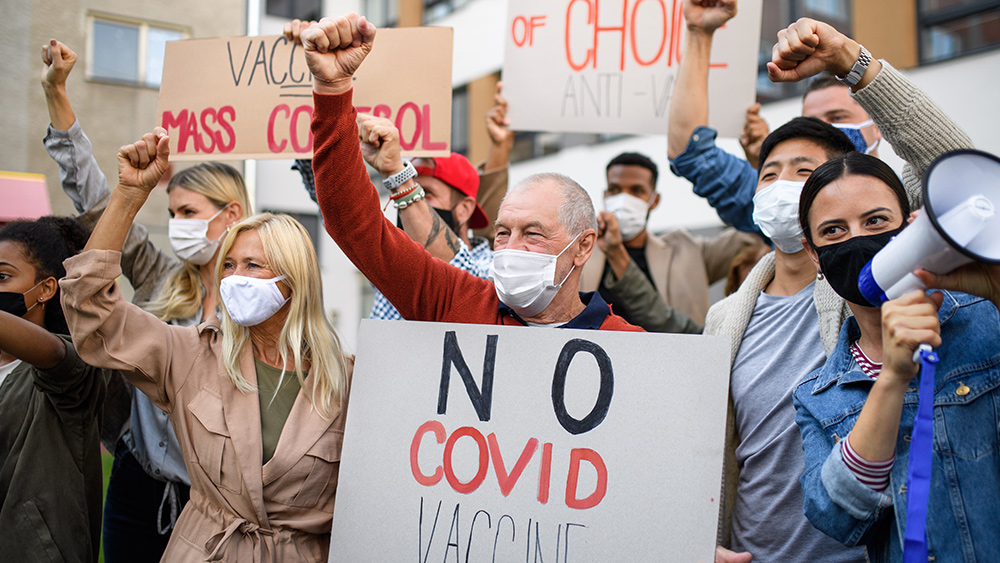Gallup: 24% of US adults refuse vaccination – and likely to stay that way
07/26/2021 / By Ramon Tomey

A recent Gallup poll has shown that 24 percent of adults do not plan to get the Wuhan coronavirus (COVID-19) vaccine. Of those not planning to get vaccinated, almost 80 percent have said they were unlikely to reconsider – with more than half stating their decision not to get vaccinated is final. According to Gallup data, the percentage of people who refuse to get vaccinated had been stable for the past three months.
According to the Gallup poll conducted from May 18 to 23, 60 percent of U.S. adults reported being fully vaccinated against COVID-19. Twelve percent of respondents planned to get their vaccine doses, while four percent had been partially vaccinated. All in all, these comprised 76 percent of respondents the poll counted as vaccinated.
The May 2021 poll found that 24 percent of “vaccine-hesitant” adults were not distributed equally across major demographic groups. Forty-six percent of Republican respondents did not plan to get vaccinated, compared to 31 percent of independent-leaning respondents and six percent of Democrat respondents. Thirty-one percent of respondents without a college degree are much more likely to refuse vaccinations compared to only 12 percent of college graduates.
It also found that vaccine hesitancy was also unequally distributed among age groups. Middle-aged Americans – those between 35 and 54 years old – were more likely to have reservations with the vaccine. Thirty-three percent of middle-aged respondents said they had doubts about COVID-19 vaccination. Meanwhile, 22 percent of younger respondents and 20 percent of older respondents had reservations about the COVID-19 vaccine.
The analytics firm’s March and April 2021 surveys did not find an overarching reason as to why vaccine-reluctant Americans did not want to get inoculated. Instead, they found common reasons for respondents not wanting to get vaccinated.
Twenty-three percent of respondents wanted to confirm the vaccine’s safety, while 20 percent of respondents believed they would not get seriously ill from the Wuhan coronavirus. Sixteen percent expressed concerns about the rushed development of the COVID-19 vaccines, with the same percentage expressing mistrust of vaccines in general. Ten percent of respondents cited allergies or allergy concerns for their refusal to get vaccinated. An additional 10 percent of respondents said they already have immunity after recovering from a bout of COVID-19.
Entities are now thinking of ways to encourage COVID-19 vaccination
The Gallup findings came as the federal government and state governments are encouraging people with second thoughts to get vaccinated against COVID-19. On May 4, President Joe Biden announced plans to boost its COVID-19 vaccination efforts during a White House briefing. He said the administration planned to partially vaccinate at least 70 percent of Americans and fully vaccinate 160 million by the Fourth of July holiday.
Biden also touted his administration’s great strides in vaccinating people against COVID-19. He said during the briefing: “Almost 150 million Americans have gotten at least one shot [and] over 105 million Americans are fully vaccinated. [Among] seniors, we are nearing 85 percent of those who have gotten their first shot. Seventy percent of the seniors are now fully vaccinated. It’s a dramatic turnaround from when we were in January [2021], when less than two percent of adults and less than one percent of seniors were fully vaccinated.”
To achieve this goal, the federal government has announced incentives to make vaccination rewarding. These included free childcare, free air travel and free sports tickets. Meanwhile, some states have also encouraged vaccine-hesitant Americans to get their shots through different approaches – including lotteries.
True enough, two states have implemented vaccine lotteries – in which people who get their COVID-19 shots gain a chance to win huge amounts of money. Back in May, the state of Ohio announced it will reward five vaccinated residents up to $1 million under its vaccine lottery promotion. Gov. Mike DeWine said the lottery would be funded by coronavirus relief funds from the federal government.
In a tweet, DeWine defended his decision to launch the vaccine lottery against critics who dubbed his plan “crazy” and a “waste of money.” He wrote: “[Truly,] the real waste at this point in the pandemic – when the vaccine is readily available to anyone who wants it – is a life lost to COVID-19.”
Not long after, New Mexico followed Ohio’s steps and launched its own vaccine lottery. On June 1, the state announced that vaccinated residents who sign up for the “Vax 2 the Max” lottery could win a grand prize amounting to $5 million. Gov. Michelle Lujan Grisham said the vaccine lottery would be funded by coronavirus relief money from the federal government – just like its Ohio counterpart.
Grisham also backed up her decision to implement the vaccine lottery, saying: “I’m excited to add a little fun to our nation-leading vaccination push.” She added that getting vaccinated “is the right thing to do – for yourself … [and] your family.”
Visit Vaccines.news to read more articles about COVID-19 vaccine hesitancy and states’ efforts to address it.
Sources include:
Tagged Under: coronavirus vaccine, covid-19 pandemic, deception, gallup poll, health freedom, mass vaccination, medical choice, New Mexico, ohio, vaccination drive, vaccine hesitancy, vaccine lottery, vaccine refusal, vaccines, Wuhan coronavirus
RECENT NEWS & ARTICLES
COPYRIGHT © 2017 IMMUNIZATION NEWS




















